Themes of Childhood Deprivation, Revolution, and Acts of Creation by Consumption seen in the Arcs of Gouda from Ghost in the Shell Stand Alone Complex 2nd Gig, Full Metal Alchemist Brotherhood's Father, The Brainy Gremlin from Gremlins 2, and Hitler
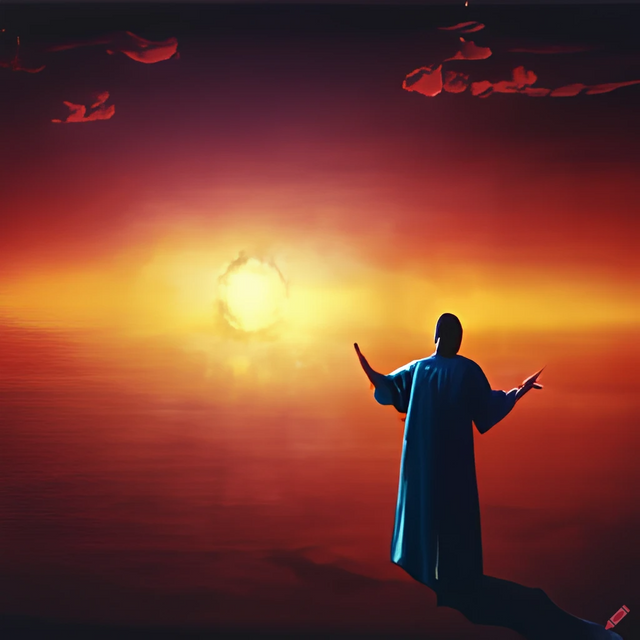
Acts of creation by consumption is a concept that explores the idea that in order to create, we must first consume. It suggests that the process of creation is fueled by a consumption of materials, ideas, and experiences. This is seen in various aspects of life, from the creation of art to the formation of new ideas in science and technology. The concept of "acts of creation by consumption" refers to the idea that in order to create something new, one must first consume and understand existing knowledge or materials. This can involve analyzing and interpreting pre-existing ideas or objects, and then synthesizing them into something new. The idea that destruction can lead to creation, or that consumption can lead to creation, is not a new one. However, it is an idea that can be explored in-depth, and it is especially relevant when considering this paper's inspirational sources.
In Ghost in the Shell, Gouda is a character who embodies the idea of acts of creation by consumption. He is a former member of the Japanese military who becomes a terrorist seeking revenge against the government. He believes that the only way to bring about change is through destruction, and he sees himself as a necessary catalyst for this change. He is a highly intelligent and manipulative individual who seeks to create a new world order by exploiting existing power structures and systems. He recognizes the limitations of the current political and economic systems, and uses his knowledge of these systems to manipulate and control them for his own gain. Through the use of technology and media manipulation, Gouda aims to create a new reality in which he holds all the power.
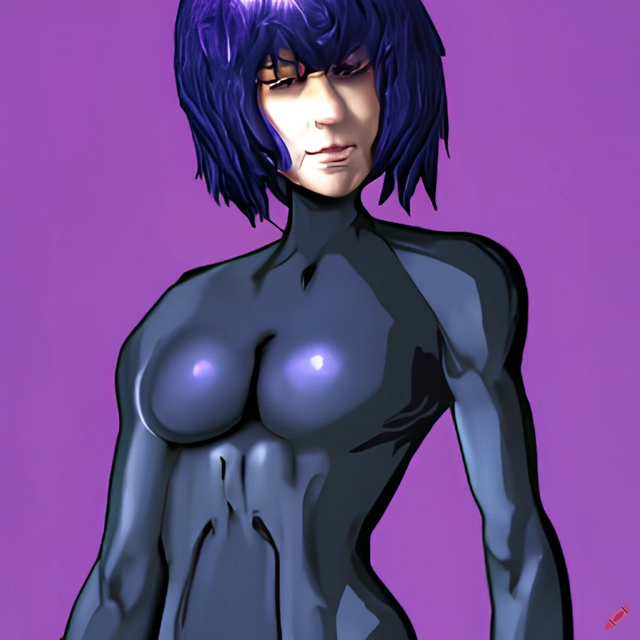
(In my youth this woman aroused me)
Gouda's character can also be seen as an embodiment of the idea that creation can be achieved through destruction. He seeks to overthrow the current system in order to create a new one, and is willing to use violent means to achieve his goals. However, his approach is not simply one of destruction, but rather a strategic use of destruction in order to create something new. He is a man who is obsessed with power and control, and he believes that the only way to achieve these things is through the consumption of others. Gouda uses his power and influence to manipulate and control those around him, often resorting to violence and coercion to get what he wants. By destroying the corrupt system, Gouda believes he is creating a better world.
The character Father from Fullmetal Brotherhood Alchemist is another example of the destructive potential of creation. In Fullmetal Alchemist: Brotherhood, the character of Father is initially introduced as the "Dwarf in the Flask," a homunculus created by the alchemist Van Hohenheim using forbidden alchemy. Alchemy in the series revolves around an equal exchange of energy, and the concept of transmutation involves the transformation of one substance into another, often with the goal of creating something new and beneficial. As the series progresses, we learn more about Father's past and how his experiences have shaped him into the power-hungry and manipulative villain he becomes. One aspect of his past that is particularly important is his deprived childhood, which is reflected in his time spent as the Dwarf in the Flask.

(Spiderman is not featured in this essay)
From a young age, Father was deprived of basic human needs like love, affection, and companionship. He was created in a flask, isolated from the world and unable to form relationships with anyone. This lack of social interaction left him feeling alone and powerless, and he became obsessed with gaining more power and control over his surroundings. This desire for power is evident throughout the series, as Father seeks to become the ultimate being and control the world.
Another way that Father's deprived childhood is reflected in his character is through his manipulation of others. As a child, he was powerless and unable to control his own circumstances. As the Dwarf in the Flask, he learned to manipulate others in order to get what he wanted. He uses his charisma and intelligence to deceive those around him, often playing on their emotions and desires to get them to do his bidding. This behavior is reminiscent of a child who has learned to manipulate their parents or caregivers in order to get what they want.
Additionally, Father's actions as the Dwarf in the Flask are motivated by a deep sense of insecurity and inferiority. He was created as a flawed being, with limitations that he was unable to overcome. This feeling of inadequacy is reflected in his desire to become the ultimate being, to surpass the limitations of his own existence. He is constantly striving for perfection, driven by a fear of being seen as weak or flawed.
He was created by the alchemists who sought to create the perfect being, fueled by the consumption of the souls of thousands of people. Father is a powerful being who seeks to become a god by absorbing the power of others. He embodies the idea that consumption can lead to creation. By consuming the souls of others, Father gains more power, which he then uses to create a new world. Father's actions may be destructive, but they are also creative, in a twisted and ultimately flawed way. He is able to manipulate the very fabric of reality and create new things, such as his own army of Homunculi. Father's character represents the destructive potential of consumption. He is a being that seeks to consume and control everything around him, and his ultimate goal is to consume the entire world.
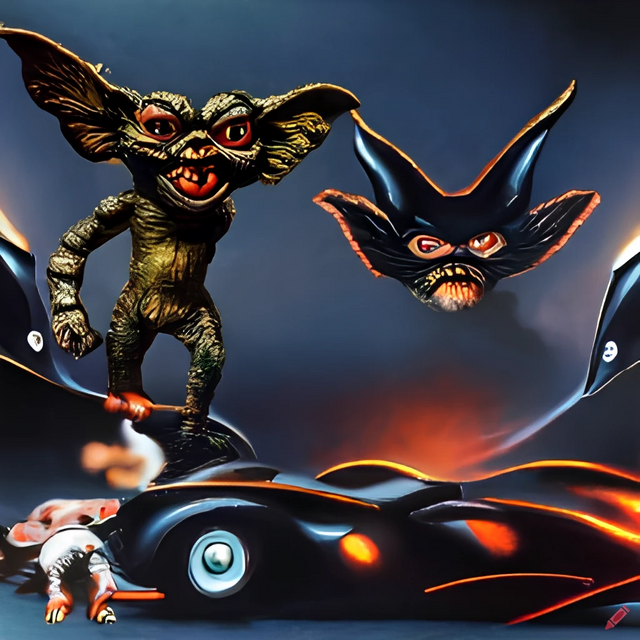
(Evidence of Gremlin existence clearly shown here attacking the batmobile)
In "Gremlins 2: The New Batch," the Gremlins are creatures that are born from consumption, and also present a compelling allegory for how to raise and treat children to ensure a healthy society, represented by the rules for caring for Gizmo, the lovable Mogwai. The film argues that, by following certain guidelines, individuals can prevent the onset of rebellious and aimless behavior in children that can lead to societal decay. However, the humans in the film disregard these rules, leading to the creation of the gremlins, who symbolize the destructive and uncontrollable consequences of neglecting such guidelines. The irony of Fred, a human who dresses up as a monster but is afraid of the real monsters his kind created, highlights how their society has become divorced from its own creation, a symbol of how humans become disconnected from the consequences of their own actions.
Stripe and his gang, the initial gremlins, embody the symptoms of a society gone corrupt, with their aimless rebellion and desire for destruction. The Brainy Gremlin's later statement that none of the gremlins had ever been to New York before represents their deprived childhoods. However, the Gremlins can also be seen as a metaphor for the creative potential of acts of creation by consumption. The Gremlins are not just mindless destructive forces; they are also playful and creative. They use their abilities to manipulate their environment and create new things. For example, the gremlins' destruction of a television studio ultimately leads to the creation of a new television channel. They turn a bar into a jazz club, and create their own version of Snow White. The gremlins' actions may seem destructive, but they are ultimately creative, in their own twisted way.
As more and more gremlins are spawned, Brainy Gremlin emerges much like the dwarf in the flask as a consequence of human experimentation. He is a powerful leader who seeks to harness the power of consumption to create new and exciting forms of life. He represents the intelligent and manipulative individuals who emerge from such societal chaos to organize the rest. Rather than simply destroying and causing chaos, the Brainy Gremlin encourages his fellow gremlins to consume and assimilate new forms of technology and culture in order to create something new. Rather than aimless mayhem he seeks to lead the gremlins towards a shared vision of dominance and power.
One of the key examples of this is the way in which the Brainy Gremlin encourages the development of the Electric Gremlin. By consuming and absorbing the power of a city's electrical grid, the Electric Gremlin is transformed into a new and powerful creature, capable of achieving feats that no other gremlin could. Rather than seeing the Bat Gremlin as a rival, the Brainy Gremlin recognizes the potential in the creature, and works to cultivate and enhance its abilities. In doing so, he strengthens the gremlins as a collective force, enabling them to achieve their goals more effectively by improving him. The brainy gremlin sees the potential for creation in the other rebellious gremlins which the humans are quick to dismiss as crude and destructive.
Throughout "Gremlins 2: The New Batch," the Brainy Gremlin demonstrates a commitment to acts of creation through consumption. By assimilating and merging different forms of technology and culture, he seeks to create something new and exciting. When the Childish Gremlin demands attention and threatens to undermine the Brainy Gremlin's authority, the Brainy Gremlin takes swift and brutal action, shooting the creature on live television. This demonstrates the Brainy Gremlin's commitment to maintaining order and discipline among the gremlins, even at the cost of individual lives. While he may be ruthless at times and his methods unorthodox, his leadership is effective and efficient, allowing the gremlins to achieve more together than they could on their own, and his goal is ultimately one of creation and innovation.
Liberal policies and cultural shifts in Germany during the 1920s were seen as a threat to traditional German values and identity. The Weimar Republic was known for its progressive social policies, including greater freedoms for women and minorities, as well as a flourishing arts scene that celebrated avant-garde and often controversial works. The Treaty of Versailles imposed harsh penalties on Germany, including heavy reparations, territorial losses, and strict limitations on military power. These penalties, coupled with the global economic downturn of the 1920s, led to widespread poverty and unemployment, particularly among the working class. Many Germans saw these changes as undermining their national identity and values, contributing to a sense of disillusionment and alienation. The Weimar Republic, Germany's first attempt at democracy, was perceived by many Germans as weak and ineffective in addressing these issues.
Young people in particular were often disenchanted with the Weimar Republic and traditional political structures. Many were attracted to radical political movements, such as the Nazi party, which offered a sense of purpose and belonging. The Nazis targeted young people with propaganda that emphasized the restoration of German pride and power, as well as a rejection of the perceived decadence and corruption of mainstream society.
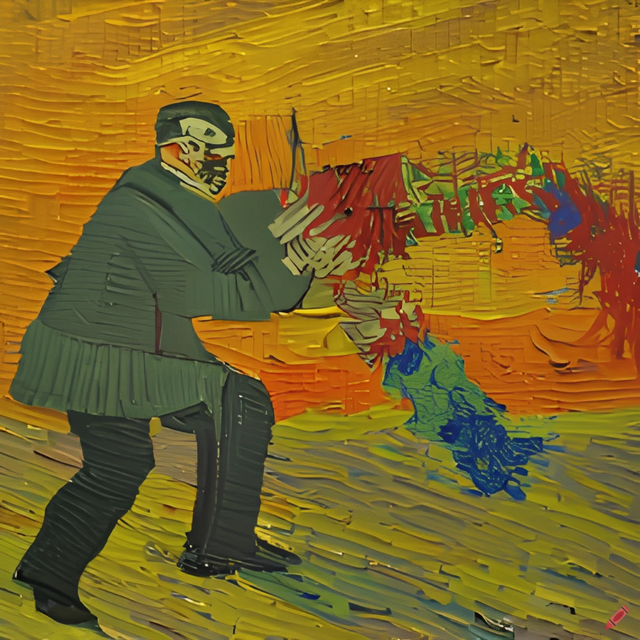
(Rarely witnessed Van Gogh rendition of that one time Hitler wrestled with a pinata snake
Adolf Hitler experienced a deprived childhood marked by poverty, rejection, and disappointment. His father was a civil servant who struggled to support the family, and his mother was emotionally distant and died when he was only 18. Hitler struggled in school and was often beaten by his father, leading to feelings of inadequacy and resentment. These early experiences likely contributed to his later radical political beliefs and his desire for power and control.
One of Hitler's most notable qualities was his unwavering determination. He had a clear vision of what he wanted to achieve for Germany and was willing to do whatever it took to make that vision a reality. He was a tireless worker who was constantly on the move, never resting until he had achieved his goals. Hitler was also a master at propaganda. He understood the power of images and used them to his advantage, creating a cult of personality around himself and the Nazi party. He used propaganda to control the narrative, painting himself as a savior who was willing to do whatever it took to make Germany great again.
In terms of Hitler's promises to young German soldiers and officers, he and his propaganda machine propagated a sense of national pride and unity, portraying the German army as the defender of the nation against perceived external threats. Hitler promised to restore Germany to its former greatness and to provide opportunities for advancement within the military ranks.
In addition, Hitler instilled a sense of camaraderie and brotherhood among soldiers, creating a sense of loyalty to one another and to the Nazi cause. Many soldiers and officers were also attracted to the idea of a strong authoritarian government that would restore order and discipline to a nation they perceived as having been weakened by democracy and liberalism.
One could argue that the concept of acts of creation by consumption is closely tied to the life and path of Adolf Hitler. His actions may be seen as a manifestation of the idea that consumption, in this case, the consumption of power and control, can lead to creation. Hitler's vision of a better world was one that required the destruction of millions of lives. The holocaust, which primarily targeted Jewish people, led to the deaths of an estimated 6 million Jews as well as millions of people in other minority groups such as Roma, disabled individuals, homosexuals, and political dissidents. The genocide involved mass exterminations in concentration and death camps, forced labor, medical experimentation, and other atrocities. The devastating impact of Hitler's genocide on individuals, families, and entire communities cannot be overstated, and its legacy continues to be felt today.
However, it is important to note that Hitler's legacy is not solely one of destruction. Hitler's vision also led to the creation of various structures and institutions that shaped the modern world. The most significant of these is perhaps the United Nations, an international organization established after World War II to promote peace and cooperation between nations. The UN serves as a reminder of the dangers of unchecked power and nationalism, and the need for international cooperation and diplomacy.
Similarly, the European Union was formed in the aftermath of World War II as a way to promote peace and economic stability among European nations. The EU serves as a powerful symbol of the potential for collaboration and integration between previously warring nations.
The characters of Brainy Gremlin, Father, Gouda, and Hitler each represent different perspectives of the concept of acts of creation by consumption. Brainy Gremlin's intelligence and leadership allowed for the creation of a new gremlin society, but at the expense of consuming human resources. Father from Fullmetal Alchemist Brotherhood consumed the souls of countless humans to attain god-like power and become the ultimate being. Gouda from Ghost in the Shell believes that by creating chaos and instability, he can prompt people to abandon their old beliefs and systems, and embrace new ones that he has constructed. Finally, Hitler's desire for power and the creation of a "pure" Aryan race through the consumption of human lives led to one of the darkest periods in human history.
These characters demonstrate the potential dangers of unchecked consumption, and how the desire to create can lead to destructive outcomes. Their character arcs show that the pursuit of creation by consumption can lead to a loss of humanity, morality, and ethics. Each character's downfall is a warning that unchecked consumption, whether it be of resources, power, or other beings, can lead to disastrous consequences. It is important to recognize the impact of our actions and strive for a balance between consumption and creation, so that we can create a sustainable and healthy society. By reflecting on the actions and fates of these characters, we can learn important lessons about the dangers of unchecked consumption and the importance of considering the long-term impact of our actions.
(This essay was written with assistance from, but not entirely by, chatgpt. Please consider supporting me with a vote as I am homeless)
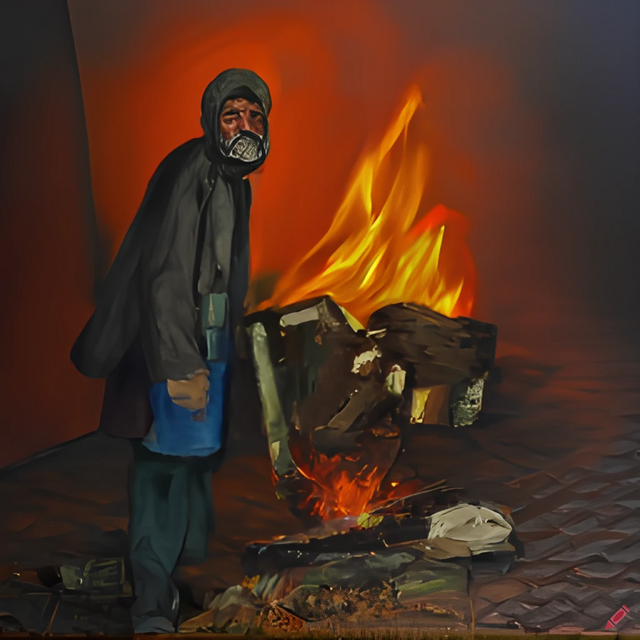
(me)